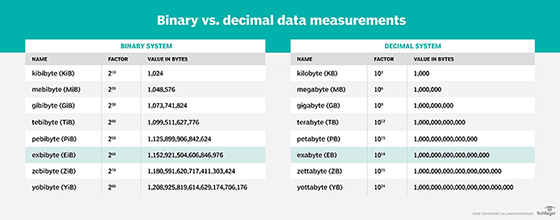exabyte (EB)
What is an exabyte?
An exabyte (EB) is a large unit of computer data storage, two to the sixtieth power bytes. The prefix exa means one billion billion, or one quintillion, which is a decimal term.
Two to the sixtieth power is actually 1,152,921,504,606,846,976 bytes in decimal, or somewhat over a quintillion (or 10 to the eighteenth power) bytes. However, it is common to say that an exabyte is approximately one quintillion bytes or 1,000,000,000,000,000,000 bytes. In decimal terms, an exabyte is a billion gigabytes (GB).
Exabytes are a unit of digital storage that are made up of bytes. A byte is comprised of eight bits. A bit is a single unit of data.
An exabyte is about the amount of digital information created on the internet each day in 2012. The total data created every day in 2020 is estimated to be 2.5 EB, according to FinancesOnline. And all the words ever spoke by human beings are said to be 5 EB.
How does an exabyte compare to other data sizes?
An exabyte is the equivalent of one quintillion bytes, one billion gigabytes or one million terabytes (TB). In context with other units of digital data and storage:
- 8 bits equals one byte
- 1,024 bytes equal one kilobyte (KB)
- 1,024 kilobytes equal one megabyte (MB)
- 1,024 megabytes equal one gigabyte
- 1,024 gigabytes equal one terabyte
- 1,024 terabytes equal one petabyte (PB)
- 1,024 petabytes equal an exabyte
- 1,024 exabytes equal a zettabyte (ZB)
- 1,024 zettabytes equal a yottabyte (YB)
Manufacturers use a different conversion to simplify the number values. Conversions are in steps of 1,000; so that 1,000 bytes is one kilobyte, 1,000 KB is one megabyte, 1,000 PB is one exabyte, 1,000 EB is one zettabyte and so on.
The yottabyte is the largest unit the International System of Units (SI) has approved. A yottabyte is about 1 septillion bytes; written our that is 1,000,000,000,000,000,000,000,000 bytes. By comparison, one yottabyte is the equivalent of one million exabytes.
Why would I need an exabyte of storage?
An exabyte is so large that it is not currently a measure of commercially available hardware. However, as big data grows, organizations will move toward exabyte storage. It is not uncommon for large companies, such as Microsoft, to store data across the organization in the petabytes.
In 2014, the United States intelligence agencies completed the Utah Data Center that was said to be able to handle yottabytes of data. However, there have been conflicting reports on the actual capacity of the $1.5 billion data center.
What's the difference between an exabyte and an exbibyte?
An exbibyte is the name of a measurement unit for data capacity. It is part of the binary system used for storage capacity measurement, which is based on powers of two. One exbibyte equals 1060.
Where one exabyte equals 1,000,000,000,000,000,000, one exbibyte equals 1,152,921,504,606,846,976 bytes. An exbibyte is more than 15.2% larger than an exabyte. The term exbibyte is used less often today in comparison to the SI-created term exabyte.

The future of exabyte in data storage
The world is consuming more data and big data, and data-generating technologies, such as IoT, continue to grow. As this growth continues, the regular use of exabytes of data will become a reality within the next five years. According to IDC, 64.2 ZB of data was created or replicated globally in 2020, and there will be 179.6 ZB of data created in 2025.
Exabyte systems have already been created, such as with the U.S. Intelligence Community's Utah Data Center, which can hold around three to 12 exabytes of data. IBM Spectrum Discover is metadata management software created to manage unstructured data stores at an exabyte scale. As time passes, more tools and systems will be created to handle exabytes of data storage.
Learn more about how to manage exabytes and even zettabytes of data.








